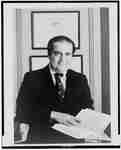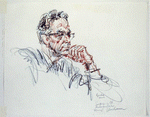Posted on January 24, 2006
Of Bums And Babies
Why Scalia's wrong on Roe
by
Daniel Clark
During the 2000 presidential campaign, George W. Bush promised to appoint "strict constructionists" to the Supreme Court. When asked to identify sitting justices who fit that description, he named Antonin Scalia and Clarence Thomas. Justice Scalia must have been pleased that the future president admired his work, but he took exception to the characterization of him as a strict constructionist, explaining instead that he considers himself an originalist. At the time, that may have sounded like a semantic trifle. It's not.

The difference can be seen in the way Scalia looks at the issue of abortion. A strict constructionist would look at the language of the Fifth and Fourteenth Amendments, both of which say that no person shall be deprived of life without due process of law, and conclude that the killing of the human unborn is constitutionally prohibited. Even the late Justice Harry Blackmun, who authored the majority opinion in Roe v. Wade, conceded that the unborn would be constitutionally protected if the Court ever found them to be "persons."
For Scalia, the answer is not so simple. As an originalist, he bases his decisions not only on what the Constitution literally says, but on what the language meant to those who wrote and ratified it at the time. Quite reasonably, he finds it improbable that legislators had unborn children in mind when they passed the Fourteenth Amendment in 1868.

Furthermore, Scalia observes that the use of the word "person" in Sec. 2 of that amendment, in reference to the taking of the census, does not include the unborn. Since he's trying to deduce the intent of the amendment's authors, he determines that the terminology must remain consistent; therefore, the term "person" in Sec. 1, recognizing a person's right to life, must not apply to the unborn, either. For this reason, he concludes that the Constitution is silent on abortion, which means that the issue should be deferred to the states under the Tenth Amendment.
There's something basically counterintuitive about this argument, though. When asked to count the number of people in a room, any normal person would simply count everybody he could see. He wouldn't try to account for the possibility that some of the women in the room were pregnant. This is a simple matter of practicality, which gives no indication of whether or not that person thinks a human fetus is in fact a person. It is illogical, then, to deduce that the authors of the Fourteenth Amendment meant to exclude the unborn from personhood, based on the practical impossibility of counting them in the census.
If that's not plain enough, let's compare the unborn with another group of people that has historically been excluded from the census: bums. Imagine that a bum stands accused of murder, but that since everyone in the courtroom seems convinced of his guilt, the judge organizes an impromptu hanging party. There would surely be protestations that the bum had been denied his due process rights, but would that be a valid complaint?
Keep in mind that attempts to count the homeless in the census are a recent development. Census takers never used to hunt down hobos and vagrants, back when those less sensitive terms were commonly used. Nobody would argue, however, that this meant Mr. Bum could be deprived of life without due process of law.
Sec. 1 of the Fourteenth Amendment does not actually exclude any human beings from personhood. It just says that "the whole number of persons in each State" should be counted, and leaves it up to the counters to figure out how to accomplish that. The fact that the Census Bureau hasn't managed to do the impossible does not mean that those who haven't been counted are literally not people.

Now that the government's methods have advanced to the point where it believes it can count the homeless, it is making the effort. The absence of homeless people from previous counts does not now mean that they're not constitutionally "persons," otherwise their current inclusion in the census would be unconstitutional. Likewise, it would offend no part of the Constitution if the bureau someday came up with a way to accurately count the human unborn.
Our forefathers may not have recognized that a new life begins at the instant of fertilization, but surely they did recognize that any individual member of the human species is a person. There are those who would dispute this, based on the idea that the three-fifths clause -- which had set the rules for apportionment prior to passage of the Fourteenth Amendment -- meant that a slave was only three-fifths of a person. That, however, is fallacious.
Art.1 Sec. 2 merely says that apportionment "shall be determined by adding to the whole Number of free Persons ... three fifths of all other Persons." This plainly states that non-free persons are still persons. It only says that each of those persons shall be counted as three-fifths of a unit, for the purpose of apportioning representatives. The concept of there being a distinction between factual personhood and legal personhood has no constitutional basis whatsoever.

It's not that Scalia's originalist philosophy doesn't have its place. There are plenty of terms in the Constitution for which multiple interpretations could be given -- "general welfare" and "cruel and unusual punishment," to name just a couple. When faced with ambiguities like these, it's perfectly proper to ask how those phrases were understood at the time that the Constitution was written. "Person," on the other hand, is an objectively defined word, whose meaning is in not dependent on context clues.
Justice Scalia was right when he ridiculed the "sweet mysteries of life" passage from the majority opinion in Planned Parenthood v. Casey, which said, "At the heart of liberty is the right to define one's own concept of existence, of meaning, of the universe, and of the mysteries of human life." This essentially means that every person has a right to his or her own reality, and therefore is free to disregard the immutable facts of life, at least where the issue of abortion is concerned.
Ironically, Scalia's interpretation yields that very same right to the states. Just because the Constitution protects the right to life of a "person," and just because a baby in the womb is a person as a matter of biological fact, does not mean, in Scalia's opinion, that each state is bound to define unborn babies as constitutionally protected persons. Hence, the states can define their respective concepts of existence in such a way that an unborn baby is a person, for example, in Pennsylvania, but not in Maryland. That way, its mother can transform it from a person into an inert mass of tissue, simply by driving across state lines.
This would, of course, be a dramatic improvement over the anti-constitutional pro-abortion absolutism enforced by Roe, but it would still allow the malignant germ of that ruling -- the belief that humanity can be subjectively defined -- to survive. And to think that the pro-life movement now considers it a best-case scenario, because it would result from the opinion of one of the Supreme Court's most conservative members. Sweet mysteries indeed.
-- Daniel Clark is a Staff Writer for the New Media Alliance. The New Media Alliance is a non-profit (501c3) national coalition of writers, journalists and grass-roots media outlets.
The Shinbone: The Frontier of the Free Press
Mailbag . Issue Index . Politimals